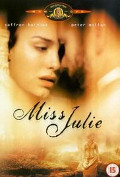
Directed by
Mike Figgis
103 minutes
Rated M
Reviewed by
Bernard Hemingway

Miss Julie (1999)
I am not familiar with August Strindberg’s iconic1888 play about the sexually-infused upstairs/downstairs power games and having seen Mike Figgis’s screen transposition of it I’m not a whole lot better off.
It is Midsummer's Eve in the house of a wealthy Swedish count who is holding a party to celebrate. The downstairs staff are also in a celebratory mood. Jean (Peter Mullan), a footman, comes down from his duties upstairs to the vast kitchen to share some of the merriment with his fiancee, the cook, Christine (Maria Doyle Kennedy), and is pursued by the count's inebriated daughter, Miss Julie (Saffron Burrows), who apparently has been goaded by Jean’s arrogant behaviour upstairs.
Figgis seems to be wanting to modernize Strindberg’s play (I assume Jean’s expletives were not in the original text) for though the late 19th century setting is preserved there is a modern day informality to the characters' interactions that feels more of our time than Strindberg's. Thematically the story is reminiscent of Joseph Losey’s 1963 classic psychodrama The Servant but whereas in that film Bogarde and Fox were steeped in the same narrow cultural value system, albeit one the victim, the other a beneficiary of it, here Burrows and Mullan appear to be from different planets. Burrows is all elegant hauteur her sensuously willowy frame in stark contrast to Mullan (best known for his roles for Mike Leigh) with his bulldog bluntness and Lawrentian working class obdurantism. With apparently nothing at stake between them except their contempt for each other we can't help but wonder why Miss Julie is so determined to bend him to her will. That Mullan keeps his North of England accent only compounds the lack of a common frame of understanding. This is ironic as Strindberg was a devotee of the “Naturalistic” style of theatre and it is exactly the naturalism of the cinema that keeps this version from convincing.
Benoît Delhomme's busy hand-held camera work which, perhaps to break up the monotony of a single set, one-act play moves around excessively and adopts contrived points of view which only compounds the lack of dramatic conviction. The words are all here (and maybe some more) and the themes apparent but Figgis’s transposition to the big screen feels too mechanical in delivery to do justice to the play's dramatic potential.
FYI: Interested parties should check out Alf Sjöberg's1951 Swedish version
Want something different?





